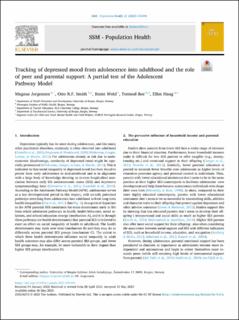| dc.contributor.author | Jørgensen, Magnus | |
| dc.contributor.author | Smith, Otto Robert Frans | |
| dc.contributor.author | Wold, Bente | |
| dc.contributor.author | Bøe, Tormod | |
| dc.contributor.author | Haug, Ellen Merethe Melingen | |
| dc.date.accessioned | 2023-10-05T06:13:04Z | |
| dc.date.available | 2023-10-05T06:13:04Z | |
| dc.date.created | 2023-06-15T18:00:45Z | |
| dc.date.issued | 2023 | |
| dc.identifier.citation | SSM - Population Health. 2023, 23 . | en_US |
| dc.identifier.issn | 2352-8273 | |
| dc.identifier.uri | https://hdl.handle.net/11250/3094316 | |
| dc.description.abstract | Highlights • Adolescent depressed mood predicts adult depressed mood. • Peer acceptance during adolescence is not associated with adult depressed mood. • Household income moderates the effect of parental closeness on adult depressed mood. | en_US |
| dc.language.iso | eng | en_US |
| dc.rights | Attribution-NonCommercial-NoDerivatives 4.0 Internasjonal | * |
| dc.rights.uri | http://creativecommons.org/licenses/by-nc-nd/4.0/deed.no | * |
| dc.title | Tracking of depressed mood from adolescence into adulthood and the role of peer and parental support: A partial test of the Adolescent Pathway Model | en_US |
| dc.title.alternative | Tracking of depressed mood from adolescence into adulthood and the role of peer and parental support: A partial test of the Adolescent Pathway Model | en_US |
| dc.type | Peer reviewed | en_US |
| dc.type | Journal article | en_US |
| dc.description.version | publishedVersion | en_US |
| dc.source.pagenumber | 0 | en_US |
| dc.source.volume | 23 | en_US |
| dc.source.journal | SSM - Population Health | en_US |
| dc.identifier.doi | 10.1016/j.ssmph.2023.101440 | |
| dc.identifier.cristin | 2155054 | |
| cristin.ispublished | true | |
| cristin.fulltext | original | |
| cristin.qualitycode | 1 | |

